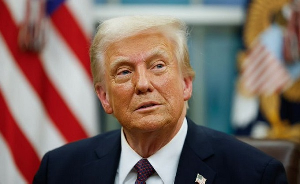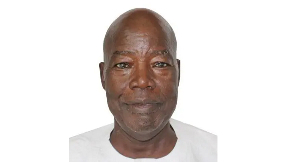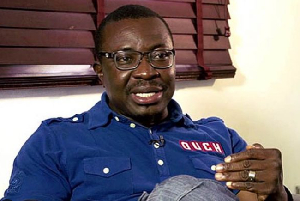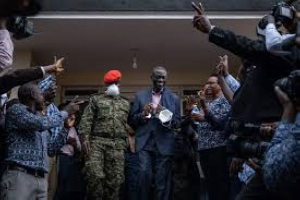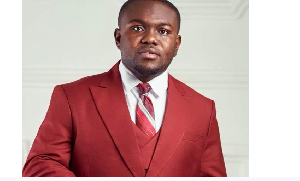The news about the defeated candidates that contested the NPP primaries to elect parliamentary candidates on the ticket of the NPP to contest the constituency seat at election 2020 is not unique to Kumawu Sekyere Constituency.
Shamefully, it cuts across the entire country where such elections took place. However, I shall be discussing that of Kumawu, my place of birth, and it goes for the whole country and for all the political parties since they are all into this stinking rot.
It has come to my knowledge from a source in Kumawu and as read from the Ghana internet news portal that one Lawyer Edward Kofi Osei, a contestant in the just ended NPP primaries election by the delegates to elect a parliamentary candidate to contest for the constituency seat on the ticket of NPP for election 2020 that his agents are clawing back the bribe he paid to some of the delegates.
It is alleged that he paid three thousand Ghana new Cedis (GHS3,0000) to each of the delegates who agreed on promise to cast their vote for him. I have been made to understand that he or his agents took such delegates to see a Mallam in Ejisu to secure their assurance and confirmation that they would vote for him.
Why were the delegates taken before the Mallam if the assertion is true? Why does he not go back to the Mallam to ask him to spiritually deal mercilessly with the defaulters but he is approaching them in person via his agents to ask for his money back?
There is no denying that money payment was made to some delegates for agreed verbal contract. Nonetheless, what baffles me is the intimidation with which the lawyer's agents have been confronting the delegates who took the money but did not vote for him, to collect back the money.
Let me ask my fellow Kumawu citizen, a lawyer by profession and a resident in the United States of America (USA) a few questions.
1. Why did he part with GHS3,000 or so to certain delegates?
2. Was the money given to the delegates a gift or a bribe payment?
3. If it was a gift or a bribe, for what reason was the money parted from him to the delegates? Was it to influence them for a reason and if yes, what was it?
4. Why is the money being crawled back from the delegates that failed to vote for him at the NPP primaries?
5. Is it morally justified to collect back a gift given to someone by you? If yes, or no, please explain why.
It is unreasonable for one to go back to retrieve a gift he or she has parted with to someone. Nevertheless, a bribe payment can be collected back if the terms of conditions upon which the bribe was paid are not fulfilled. Again, you risk having troubles on your hands since paying bribe to influence an official is against certain Sections of the Ghana Criminal Code 1960 (Act 29).
Below are certain relevant Sections quoted directly from the Ghana Criminal Code 1960 (Act 29). I hope the lawyer and the delegates will take close examination of them. Both the giver and the receiver of the money in this instance could be said to have breached the law hence risk consequences.
Section 239—Corruption, etc. of and by Public officer, or Juror.
(1) Every public officer or juror who commits corruption, or wilful oppression, or extortion, in respect of the duties of his office, shall be guilty of a misdemeanour.
(2) Whoever corrupts any person in respect of any duties as a public officer or juror shall be guilty of a misdemeanour.
Section 240—Explanation as to Corruption by Public Officer, etc.
A public officer, juror, or voter is guilty of corruption in respect of the duties of his office or vote, if he directly or indirectly agrees or offers to permit his conduct as such officer, juror, or voter to be influenced by the gift, promise, or prospect of any valuable consideration to be received by him, or by any other person, from any person whomsoever.
Section 241—Explanation as to Corruption of Public Officer, etc.
A person is guilty of corrupting a public officer, juror, or voter in respect of the duties of his office or in respect of his vote, if he endeavours directly or indirectly to influence the conduct of such public officer, juror, or voter in respect of the duties of his office or in respect of his vote, by the gift, promise, or prospect of any valuable consideration to be received by such public officer, juror, or voter, or by other person, from any person whomsoever.
Section 242—Special Explanation as to Corruption of and by Public Officer, etc.
It is immaterial, for the purposes of section 240 or 241, that the person respecting whose conduct the endeavour, agreement, or offer therein mentioned is made is not yet at the time of the making of such endeavour, agreement, or offer, such a public officer, juror, or voter, if the endeavour, agreement, or offer is made in the expectation that he will or may become or act as such officer, juror, or voter.
Section 243—Corrupt Agreement for Lawful Consideration, etc.
It is immaterial, for the purposes of section 240, 241 or 242, whether the act to be done by a person in consideration or in pursuance of any such gift, promise, prospect, agreement or offer as therein mentioned be in any manner criminal or wrongful otherwise than by reason of the provisions of the said sections.
Section 244—Acceptance of Bribe by Public Officer, etc., After Doing Act.
If, after a person has done any act as a public officer, juror, or voter, he secretly accepts, or agrees or offers secretly to accept for himself or for any other person, any valuable consideration on account of such act, he shall be presumed, until the contrary is shown, to have been guilty of corruption, within the meaning of this Chapter, in respect of that act before the doing thereof.
Section 245—Promise of bribe to Public Officer, etc. After act Done.
If, after a public officer, juror, or voter has done any act as such officer, juror, or voter, any other person secretly agrees or offers to give to or procure for him or any other person any valuable consideration on account of such act, the person so agreeing or offering shall be presumed, until the contrary is shown, to have been guilty of having, before the doing of such act, corrupted such public officer, juror, or voter, in respect of such act.
Section 247—Explanation as to Extortion.
A public officer is guilty of extortion who, under colour of his office, demands or obtains from any person, whether for purposes or for himself or any other person any money or valuable consideration which he knows that he is not lawfully authorised to demand or obtain, or at a time at which he knows that he is not lawfully authorised to demand obtain the same.
I will end here without any further elaboration as a word to the wise is enough. Nonetheless, I expect the noble lawyer to join me in fighting off those so-called powerful traditional overlords from the other divisions within Asanteman Council who have descended on Kumawuman to rewrite our history in order for them to dominate us, rob Kumawuman of its wealth in broad daylight while Kumawuman continues to lag far behind her peers in, or lacks, essential developments, but suffers dilapidation.
Opinions of Thursday, 25 June 2020
Columnist: Rockson Adofo



